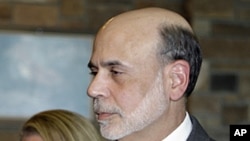U.S. Federal Reserve Chairman Ben Bernanke says the central bank still has a "range of tools" it can use to stimulate the economy, but he did not say when or how they might be used. Bernanke spoke Friday to a gathering of top economists at a mountain resort in the western U.S. state of Wyoming. Investors and economists have been speculating for days about what, if any, new stimulus efforts Bernanke might outline in this speech.
The head of the U.S. central bank, Ben Bernanke, tried to reassure investors that the Federal Reserve still has ways to bolster the flagging U.S. economy, even after it has used its usual tools, such as cutting key interest rates. Those rates have been slashed to nearly zero, leaving no room for further such action. The Fed has also bought hundreds of billions of dollars worth of financial assets in a maneuver called "quantitative easing" intended to cut long-term interest rates and bolster lending and spending.
But Bernanke gave no specifics on what the bank might do now, other than scheduling a longer than previously planned meeting of top Fed officials late in September.
Mark Zandi, Chief Economist of Moody's Analytics, says Bernanke is probably going to have to do more to stimulate the economy, and might announce that action in September.
"I think it will be very important for them at that time to give us a clearer sense of where they are headed. They are going to have to ease monetary policy further," he said.
Bernanke called on Washington to help growth by working out better ways to cope with debt, and adopt effective tax, trade and regulatory policies.
He said "most" of the economic policies that support robust economic growth are outside the province of the central bank. In his view, the recent political wrangling over the debt ceiling, government spending and other issues hurt the economy by cutting business and consumer confidence.
Bernanke said it is necessary to cut the debt in the long term, but urged policymakers to do that without slashing the spending that is supporting the fragile recovery in the short term.
The chief economist for Wells Fargo Economics, John Sylvia, says that concern was echoed by some of the central bankers from other nations at the gathering.
"There was this discussion about being very aggressive about fiscal policy in the short run that could be counter productive in the longer term to economic growth," he said.
Sylvia and Zandi spoke on the Bloomberg financial news service.
Bernanke spoke shortly after a report showed that the U.S. economy grew more slowly than first thought in April, May, and June. Commerce Department experts say the economy expanded at a 1 percent annual rate in the second quarter. That is even slower than the meager 1.3 percent growth experts first estimated, and less than investors expected. The report is a routine update made as experts get additional data.
A separate study by the University of Michigan showed that consumer confidence declined in August. Economists track consumer sentiment for hints about the consumer spending that drives most U.S. economic activity.
Bernanke: Fed Has More Ways To Boost US Economy














